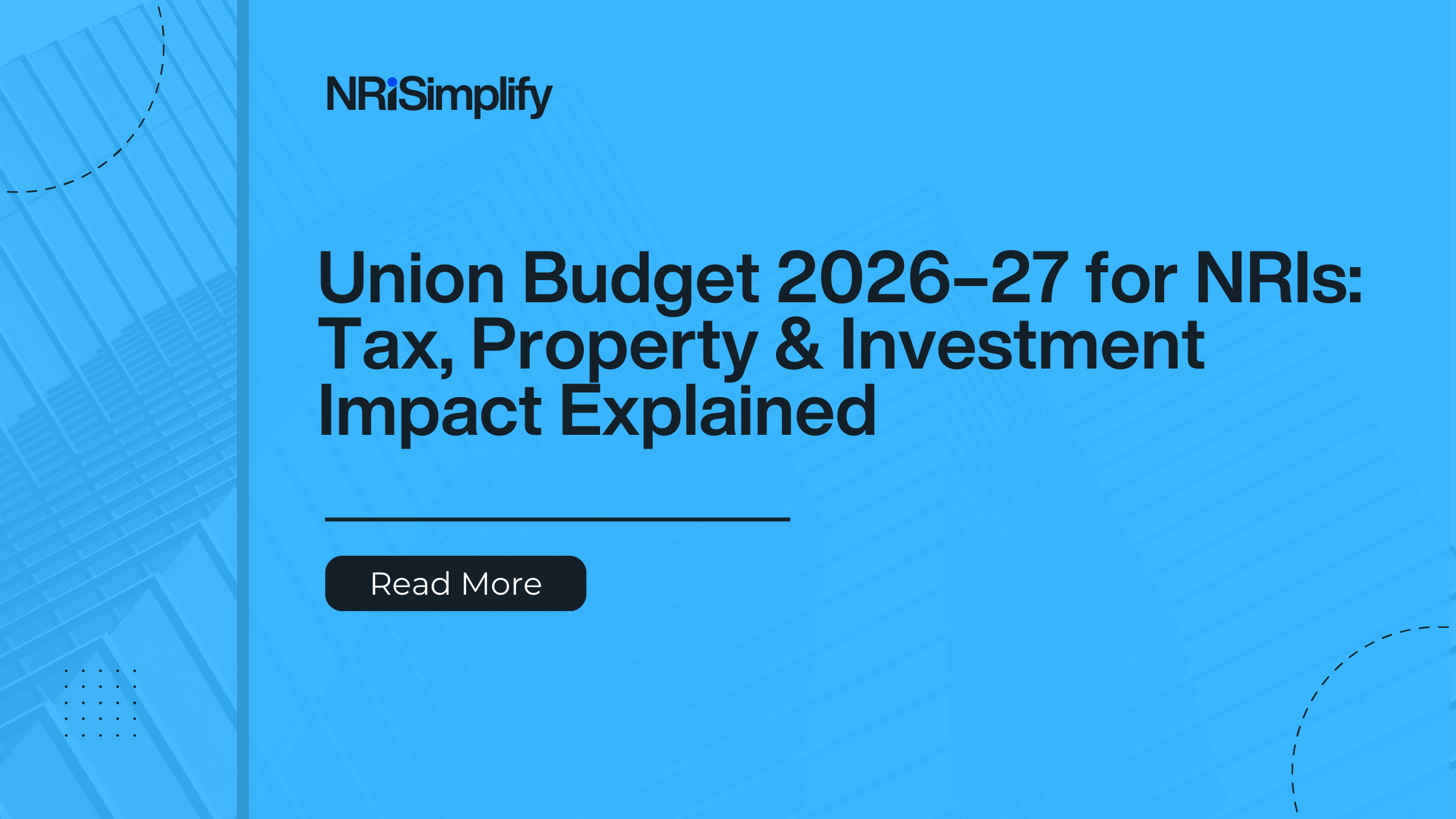The Indian real estate market has emerged as a lucrative investment destination for NRIs, offering a blend of financial security, long-term appreciation, and a connection to their roots. For NRIs looking to explore diverse investment avenues, the real estate sector in India offers numerous opportunities. The market has seen significant reforms, enhanced transparency, and steady growth, making it an attractive option for NRIs seeking to diversify their investment portfolios.
In this blog, NRI Simplify explores why NRIs are increasingly investing in Indian real estate, the benefits they gain, and the essential factors to consider before making a purchase.
1. Strong Economic Growth & Market Stability
India remains one of the fastest-growing economies in the world, with a projected GDP growth of 6–7% annually. The country’s expanding middle class, rapid urbanization, and government-backed infrastructure developments contribute to a strong and stable real estate market.
Why It Matters for NRIs:
- Rising demand for residential and commercial properties.
- Government-backed infrastructure projects enhance property values.
- Increasing foreign direct investments (FDI) improve market confidence.
2. Simplified Investment Process for NRIs
The Indian government has streamlined the property-buying process for NRIs, making it easier than ever to invest remotely. Digital advancements allow NRIs to explore, purchase, and manage real estate from anywhere in the world.
Key Highlights:
- NRIs can invest in residential and commercial properties under FEMA rules.
- No special approvals required for purchase transactions.
- Digital payments, online documentation, and Power of Attorney (PoA) allow for remote investments.
3. Depreciating Rupee: Currency Advantage
The Indian Rupee (INR) has weakened against major foreign currencies (USD, GBP, AED, etc.), providing NRIs an Simplify when investing in Indian property.
How It Benefits NRIs:
- Higher purchasing power: A weaker rupee means NRIs can buy properties at lower costs when converting foreign currency.
- Better ROI when repatriating funds: If the rupee appreciates, NRIs earn more when selling their property.
4. Diverse Investment Options
NRIs can choose from a variety of real estate investment opportunities based on their financial goals.
Types of Real Estate Investments:
- Residential Properties – Apartments, villas, and townhouses in metro cities and emerging hubs.
- Commercial Spaces – Office spaces, co-working hubs, and retail outlets with strong rental demand.
- Real Estate Investment Trusts (REITs) – Invest in commercial properties without direct ownership.
- Luxury & Holiday Homes – High-net-worth NRIs are investing in premium second homes in Goa, Kerala, and Uttarakhand.
5. High Rental Yields & Passive Income
Investing in Indian real estate provides NRIs with a steady rental income stream, especially in high-demand cities like Mumbai, Bengaluru, Hyderabad, Pune, and Gurgaon.
How NRIs Can Benefit from Rental Income:
- High rental demand: Urban migration and remote work culture boost rental markets.
- Steady passive income: Rental returns range from 3–5% annually for residential properties and 6–9% for commercial properties.
- Favorable tenant laws: The Model Tenancy Act makes leasing agreements more secure and NRI-friendly.
6. Tax Benefits & Financial Advantages for NRIs
The Indian government offers multiple tax incentives for NRIs investing in real estate.
Tax Incentives for NRIs:
- Section 80C – Deductions of ₹1.5 lakh per annum on home loan principal repayment.
- Section 24 – Tax deduction of ₹2 lakh per annum on home loan interest.
- Section 54 & 54EC – Capital gains exemptions when reinvesting proceeds in another property or bonds.
- No Wealth Tax – India does not impose a wealth tax on property ownership.
7. RERA & Government Initiatives for Transparency
The Real Estate (Regulation and Development) Act (RERA), 2016 ensures transparency in the real estate sector by holding developers accountable.
How RERA Protects NRI Investors:
- Mandatory project registration with RERA.
- Timely project delivery with financial penalties for delays.
- Standardized agreements to prevent fraud.
- Legal recourse in case of disputes.
8. Emotional Connection & Future Planning
For many NRIs, investing in Indian real estate is not just a financial decision but also an emotional one.
Personal Use:
- A home for vacations or eventual relocation.
- Family security: A property for parents or future generations.
- Education: NRIs investing in homes near top universities for their children’s future.
Final Thoughts: Should NRIs Invest in Indian Real Estate?
Absolutely! NRIs investing in Indian real estate benefit from high returns, rental income, tax advantages, and emotional security. With government reforms improving transparency and digital advancements simplifying the process, NRIs now find it easier and safer to invest in Indian property than ever before.
Need expert guidance on your investment journey?
NRI Simplify offers end-to-end assistance for NRIs investing in Indian property, covering legal documentation, taxation, and repatriation support.
Contact NRI Simplify today for personalized real estate investment strategies!
Frequently Asked Questions (FAQs)
Q1. Why do NRIs invest in India?
NRIs invest in India for multiple reasons, including high return potential, emotional ties, rental income, and portfolio diversification. Additionally, NRIs can benefit from tax-saving investment avenues to reduce their tax liability on Indian income.
Q2. Is it a good idea for NRIs to buy property in India?
Yes, investing in Indian property is a strategic move for NRIs, offering long-term appreciation, rental income, and a secure asset in a growing economy.
Q3. Can NRIs buy any type of property in India?
NRIs can invest in residential and commercial properties, but cannot purchase agricultural land, farmhouses, or plantation property as per FEMA regulations. However, they can inherit such properties.
Q4. How can NRIs finance property purchases in India?
NRIs can finance property purchases through self-funding, NRE/NRO accounts, or home loans from Indian banks. Most banks offer NRI-specific home loan products with easy processing.






